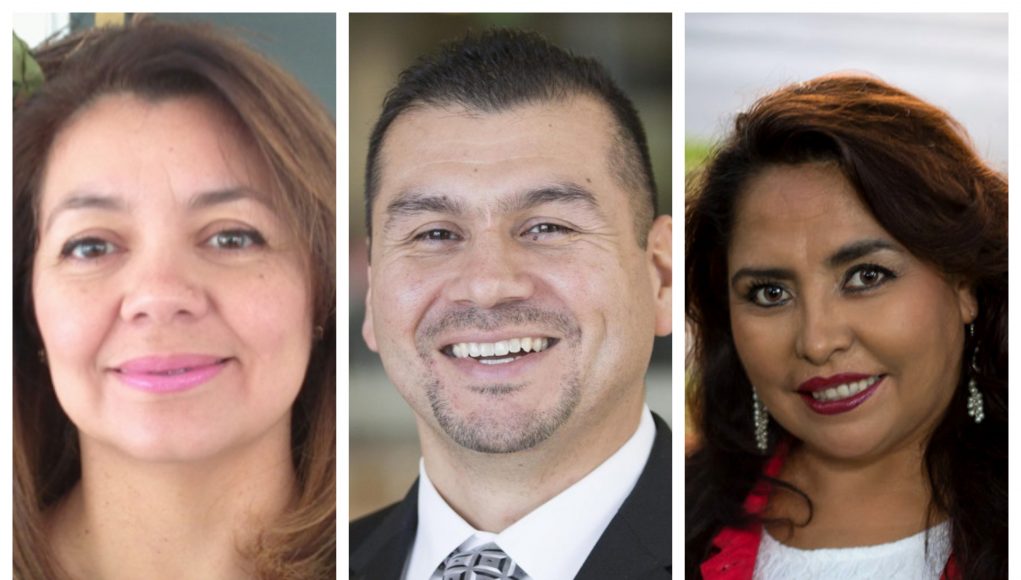As the Wisconsin Leadership Summit approaches, on October 18 and 19 at Ho-Chunk Gaming and Convention Center in Baraboo, organizers are making final preparations for panel discussions on a wide range of issues, from education to nonprofit fundraising to socially responsible businesses. One issue community members have told organizers they want added to the list: immigration.
In response to that request, a panel discussion on immigration policy in Wisconsin will take place Friday, October 19 at 9:30 am. Madison College Associate Dean Ramon Ortiz will moderate the panel, which will also include Dane County Immigration Affairs Specialist Fabiola Hamdan and Norys Piña, leader of the group Unidos Por Un Futuro Mejor (United for a Better Future) in Appleton.
Ortiz was named to Madison365’s Sí Se Puede list — our list of the most powerful Latinos in Wisconsin — in 2016. Piña and Hamdan both made the list in 2017.
Ortiz says he will moderate the panel representing himself and his own opinions, not as a representative of Madison College. He also notes that he isn’t an immigrant — in fact he’s probably less “immigrant” than many white people — but is often seen as one.
“I reflect the paradox of the Latino community in the sense that we are the nation’s earliest settlers and the most recent arrivals simultaneously,” he says. “I trace my ancestry in Texas six generations, probably further than any Anglo that I come in contact with, with yet every time I come in contact with a person on questions of immigration, I’m othered.”
Ortiz, who holds an MBA in finance and a PhD in educational leadership, says it’s critical for the American economy to have a serious conversation on immigration that goes beyond the partisan talking points.
“We have a large Baby Boomer population that’s going to be retiring quickly,” he says. “The only segment of the population that has the ability to replace that from a demographic standpoint is currently the Latino population that’s heavily driven by immigration. Rather than leveraging that, I think we’ve gotten to the point where the discourse has gotten so toxic that we are starting to cannibalize our fastest growing demographic that should theoretically be our fastest growing human capital pool. I think we’re in a very dangerous space unless we’re able to have legitimate conversations about what this demographic change means for this country, because it’s going to happen regardless. Even if people are successful in deporting every single undocumented immigrant, the demographic shift in this country and the ensuing fertility rates and growth of the population are such that we will have a multicultural country. We already are a multicultural country. We will become a majority non-white country by 2050.”
The current immigrant population is, in many ways, propping up an aging population of American citizens.
“If you’re a 60-year-old white male who’s about to retire, you probably should not be upset that there’s undocumented immigrants in this country paying hundreds of billions of dollars into your Social Security system that they will not draw down from,” Ortiz notes.
But it’s not all about economics, Ortiz says.
“I think immigration is a transnational issue, a human capital issue, it’s an economic issue, it’s a human rights issue. I think it needs to be addressed as such. I’ve always said (immigration is) the point where social justice and human capital development cross and intersect,” he says. “I think we need to understand that in dehumanizing other people, we in a sense also lose our humanity.”
The conversation at the Wisconsin Leadership Summit will focus on Wisconsin’s immigration challenges and policies, which are an important workforce issue in at least one of the state’s major industries.
“If you were successful in implementing a policy where you could wave a wand and (undocumented immigrants) would disappear and be gone, go back to wherever they came from, you would have lost half of your labor force in the dairy industry,” Ortiz notes.
Immigration policies in Wisconsin have been in the spotlight recently as more than 80 people were rounded up in a four-day sweep by Immigration and Customs Enforcement agents just over a week ago. Some Wisconsin cities, like Madison and Milwaukee, have decided not to cooperate with federal immigration enforcement, earning the ire of the Trump administration.
“I don’t think that’s the answer, but I think that’s a good start,” Ortiz says. “A city ordinance can only go so far. I think what it tells you is that the people in your community respect you as a person.”
It’s that sense of welcoming that might help Wisconsin’s communities attract and retain not only immigrants but other people of color who find solidarity with immigrants, Ortiz says.
“Creating a space where people know that they’re welcomed, doing everything in your power to protect people that are unfairly being victimized, is important,” he says.
Ortiz says the panel discussion on October 19 will focus on helping attendees understand the economic issues around immigration, not to mention the humanity of immigrants.
“One of the things that I hope people learn is immigrants are people just like them who have the same hopes and aspirations,” he says. “How immigration is handled will be the central issue, the central civil rights issue, the central economic issue, the central human rights issue for the next generation.”
Registration for the Wisconsin Leadership Summit is open now. The registration fee of $200 per person includes all panel discussions, all meals, a community arts showcase, and social and networking opportunities. The Wisconsin Leadership Summit is co-hosted by Madison365 and the Ho-Chunk Nation.




























